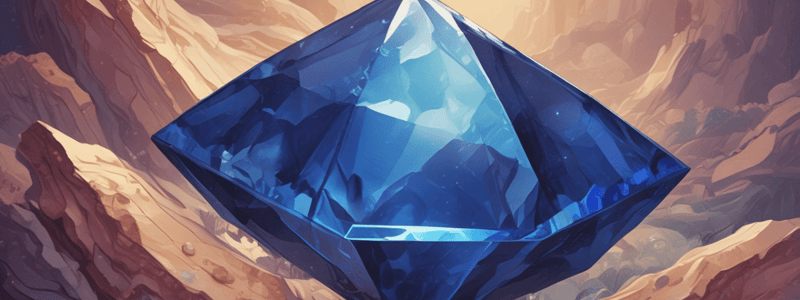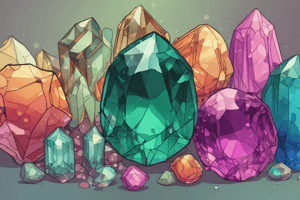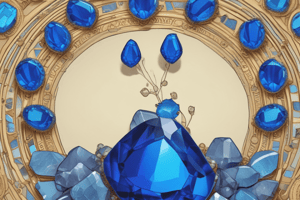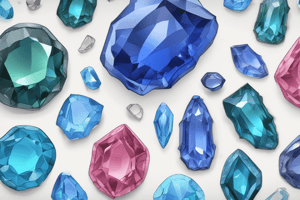Podcast
Questions and Answers
What is the most common sapphire treatment?
What is the most common sapphire treatment?
- Cavity and fracture filling with oil
- Dyeing
- Heating to improve color and clarity (correct)
- Coating with various substances
What is the characteristic of 'Kashmir' sapphires?
What is the characteristic of 'Kashmir' sapphires?
- Velvety luster (correct)
- More intense blue hue than 'Burmese' sapphires
- Dark, inky color
- Lighter hue and violetish blue color
What is the characteristic of 'Ceylon' sapphires?
What is the characteristic of 'Ceylon' sapphires?
- Dark, inky color
- More intense blue hue than 'Burmese' sapphires
- Lighter hue and violetish blue color (correct)
- Velvety luster
What is the characteristic of 'Pailin' sapphires?
What is the characteristic of 'Pailin' sapphires?
What is the most common method of synthetic sapphire production?
What is the most common method of synthetic sapphire production?
What is a common imitation material for sapphires?
What is a common imitation material for sapphires?
Where are most of the world's sapphires cut?
Where are most of the world's sapphires cut?
What is the Mohs scale rating of sapphire?
What is the Mohs scale rating of sapphire?
What is the characteristic of 'Australian' sapphires?
What is the characteristic of 'Australian' sapphires?
What is the primary source of the blue color in sapphire?
What is the primary source of the blue color in sapphire?
What is the characteristic of 'Burmese' sapphires?
What is the characteristic of 'Burmese' sapphires?
What is the term for sapphires from Yogo Gulch, Montana?
What is the term for sapphires from Yogo Gulch, Montana?
What is the term for the phenomenon where the sapphire appears to have different colors in different crystal directions?
What is the term for the phenomenon where the sapphire appears to have different colors in different crystal directions?
What is the most common treatment for sapphire?
What is the most common treatment for sapphire?
What is the shape of the crystal structure of sapphire?
What is the shape of the crystal structure of sapphire?
What is the chemical composition of sapphire?
What is the chemical composition of sapphire?
What is the term for the inclusions that appear as a fingerprint pattern in sapphire?
What is the term for the inclusions that appear as a fingerprint pattern in sapphire?
What is the market that consumes the most sapphire?
What is the market that consumes the most sapphire?
What is the term for the color variation in sapphire that appears as bands or zones?
What is the term for the color variation in sapphire that appears as bands or zones?
What is the type of environment in which non-basaltic sapphires form?
What is the type of environment in which non-basaltic sapphires form?
Flashcards are hidden until you start studying
Study Notes
Sapphire Treatments
- Rare treatments include cavity and fracture filling with oil, epoxy resin, glass-like materials, or polymers, coating with various substances, and dyeing.
- Heating to improve color and clarity is the most common sapphire treatment.
Sapphire Shapes and Cuts
- Common cuts include deep pavilions, cushion, oval, mixed cut, Trillion, emerald, pear, and marquise shapes.
Sapphire Trade Names
- "Royal blue" and "cornflower blue" are trade names for sapphires.
- "Kashmir" is widely regarded as the finest quality blue sapphire.
- "Burmese" has a more intense blue hue than Kashmir but lacks velvety luster.
- "Ceylon" and "Sri Lankan" have a lighter hue, ranging from violetish blue to blue, with slightly grayish to strong saturation.
- "Pailin" stones from Pailin, Cambodia, have a distinct characteristic.
Sapphire Origins
- Non-basaltic Metamorphic sources include Myanmar, Kashmir, Sri Lanka, and most Madagascar deposits.
- Australia, China, Nigeria, and Madagascar have basalt-related high iron (darker blue) sapphire deposits.
Sapphire Synthetic Process
- The most common method is flame fusion, while others include flux, pulling, floating zone, and hydrothermal.
Sapphire Imitations
- Common imitations include glass and synthetic spinel, Tanzanite.
Sapphire World Market
- The US is the largest consumer of sapphires, followed by Japan, Germany, Switzerland, Great Britain, and Taiwan.
- Cutters in Thailand and India fashion most of the world's sapphires.
Sapphire Characteristics
- Sapphire has a Mohs hardness of 9.
- Its species is Corundum.
Sapphire Color and Clarity
- Color range: very light to very dark violetish blue to greenish blue.
- Highly valued sapphires have a velvety blue to violetish blue color with medium to medium-dark tone and strong to vivid saturation.
- Commercial grade sapphires have a greenish blue body color or strong greenish blue pleochroism, color zoning, a grayish look, and very light or very dark tone.
Sapphire Chemical Composition
- Sapphire is composed only of aluminum and oxygen.
- It can grow in low concentrations of silicon.
Sapphire Formation
- Sapphire grows in basaltic or non-basaltic environments.
- Trace elements of iron and titanium create the blue color, with more iron resulting in a darker blue.
Sapphire Crystal Structure
- Sapphire has a barrel- or spindle-shaped hexagonal pyramid or bipyramid crystal structure.
Sapphire Phenomena
- Sapphire exhibits pleochroism, displaying slightly greenish blue and slightly violetish blue colors in different crystal directions.
- When cut correctly, the finished stone's face-up color displays more of the preferred violetish blue and less of the greenish blue hue.
Sapphire Clarity Characteristics
- Color zoning is very common in sapphires.
- Other common inclusions include silk (rutile needles), boehmite needles, included crystals, fingerprint inclusions, growth zoning, and color zoning and banding.
Studying That Suits You
Use AI to generate personalized quizzes and flashcards to suit your learning preferences.




